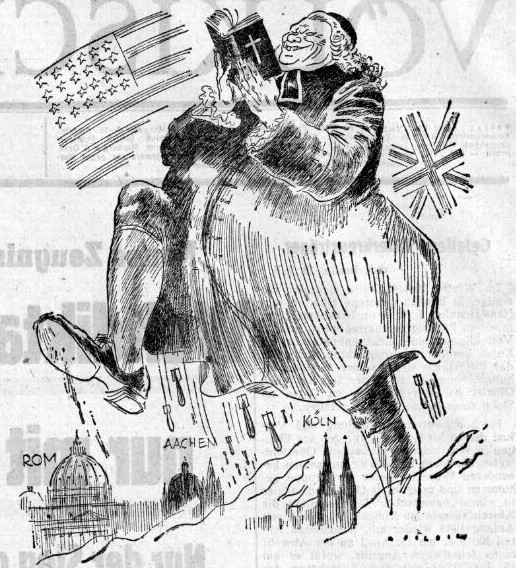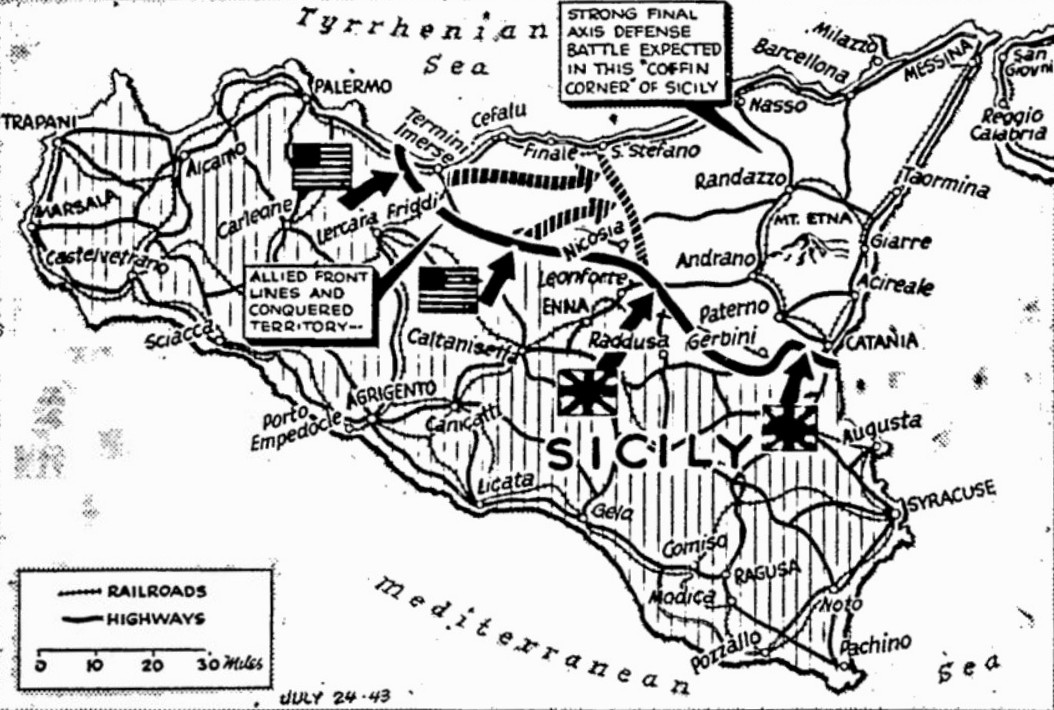Völkischer Beobachter (July 24, 1943)
Neues Zeugnis für den jüdischen Imperialismus –
Weltdiktatur der Wall Street – nur mit dem Kreml geteilt
Nur der Sieg der Achse verhindert diese Pläne
vb. Wien, 23. Juli –
Raymond Clapper, dessen äußerst enge Beziehungen zum Weißen Haus ein offenes Geheimnis sind und der in den Vereinigen Staaten als Sprachrohr Roosevelts für Dinge gilt, zu denen der USA.-Präsident aus begreiflichen Gründen nicht oder jedenfalls noch nicht öffentlich Stellung nehmen will, hat sich zu den Plänen der Errichtung einer jüdischen Weltdiktator erneut geäußert:
Ich glaube, Amerika hat weit mehr maßgeblichen Einfluss auf die Gestaltung der Dinge nach dem Kriege, als wir es selbst wissen.
Wir haben in unserer letzten Ausgabe einen in die gleiche Richtung zielenden Vorschlag der Chicago Daily Tribune bekanntgegeben, der über die Amerikanisierung Englands und des britischen Empire zu einer Diktatur der Washingtoner und Moskauer Judenclique und ihrer Handlanger führen soll. Clapper hat vor einiger Zeit eine Reise durch das Empire unternommen. Das publizistische Ergebnis war eine einzige Anklage gegen die Zustände, die er vorgefunden hat. Das war keine Überraschung. In den amerikanischen Kolonien hätte er mit weniger Mühe die Gegenstücke finden können. Interessant aber und der wirkliche Grund dieser Reise war die Tatsache, dass Clapper seine Anklage benutzte, um eine Art amerikanischer Aufsichtspflicht daraus abzuleiten. Die Pressejuden und die Wall Street spielen sich so die Bälle zu. Einmal sind es die Gliedstaaten und Kolonien des britischen Empire, die fette Absatzmärkte für die jüdische USA.-Wirtschaft abgeben sollen, ein anderes Mal ist es Ibero-Amerika.
Ibero-Amerika als Beispiel
So hat der Präsident des nordamerikanischen nationalen Außenhandelsrates, E. P. Thomas, der zugleich der Sprecher des Handelsamtes in Washington ist, jetzt, erklärt:
Ibero-Amerika ist für die Vereinigen Staaten eine Art wirtschaftspolitisches Laboratorium für die Eroberung zukünftiger Weltwirtshaftspläne.
Thomas verlangte stärkere Garantien und einen wesentlich besseren Ausbau der Sicherung des us.-amerikanischen, das heißt des jüdischen Kapitals in den iberoamerikanischen Ländern. Alle nationalen Tendenzen, die gegen das Auslandskapital zum Schutz der eigenen Wirtschaft gerichtet seien, müßten energisch abgebaut werden. Darunter versteht man in Washington die Abwehrmaßnahmen, die einige iberoamerikanische Länder gegen die Überfremdung mit us.-amerikanischen Kapital zum Schutz der eigenen Wirtschaft getroffen haben, um sich nicht wehrlos in die Abhängigkeit der Wall-Street-Juden zu begeben.
Diesen Tendenzen sucht man, wie aus der Erklärung von Thomas hervorgeht, in Washington entgegenzutreten. James S. Carson, Mitglied eines der größten us.-amerikanischen Konzerne südamerikanischer Kraftstromunternehmen, wurde in einer Rede sogar noch deutlicher. Er erklärte, es sei für die nordamerikanische Industrie von größter Wichtigkeit, die Industrialisierung Ibero-Amerikas in größtem Stil aufzunehmen und zu finanzieren, denn sie sei derart gewachsen, dass ihre Produktion im Inland nicht mehr abgesetzt werden könne. Sie müsse sich also nach außen wenden und dort neue Anlagemöglichkeiten schaffen. In Südamerika aber sollen die Methoden der künftigen Welthandelsbeherrschung sozusagen wie auf dem Exerzierplatz geübt und erprobt werden.

